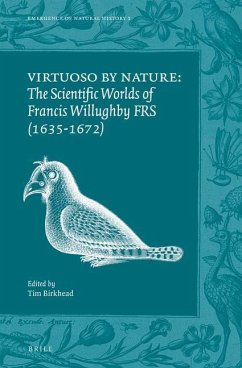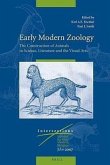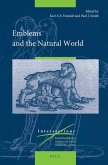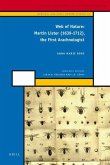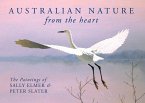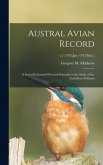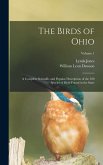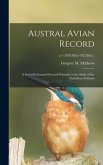Virtuoso by Nature: The Scientific Worlds of Francis Willughby Frs (1635-1672)
Virtuoso by Nature: The Scientific Worlds of Francis Willughby Frs (1635-1672)
- Gebundenes Buch
- Merkliste
- Auf die Merkliste
- Bewerten Bewerten
- Teilen
- Produkt teilen
- Produkterinnerung
- Produkterinnerung
Francis Willughby transformed the study of natural history in the mid-1600s. Using previously unexplored archives and new discoveries we show that Willughby was a polymath, a true virtuoso, who made original contributions to many different fields of endeavor.
Andere Kunden interessierten sich auch für
![Early Modern Zoology: The Construction of Animals in Science, Literature and the Visual Arts (2 Vols.) Early Modern Zoology: The Construction of Animals in Science, Literature and the Visual Arts (2 Vols.)]() Early Modern Zoology: The Construction of Animals in Science, Literature and the Visual Arts (2 Vols.)284,99 €
Early Modern Zoology: The Construction of Animals in Science, Literature and the Visual Arts (2 Vols.)284,99 €![Emblems and the Natural World Emblems and the Natural World]() Emblems and the Natural World317,99 €
Emblems and the Natural World317,99 €![Web of Nature: Martin Lister (1639-1712), the First Arachnologist Web of Nature: Martin Lister (1639-1712), the First Arachnologist]() Anna Marie RoosWeb of Nature: Martin Lister (1639-1712), the First Arachnologist244,99 €
Anna Marie RoosWeb of Nature: Martin Lister (1639-1712), the First Arachnologist244,99 €![Australian Nature: From the Heart Australian Nature: From the Heart]() Sally ElmerAustralian Nature: From the Heart31,99 €
Sally ElmerAustralian Nature: From the Heart31,99 €![Austral Avian Record; a Scientific Journal Devoted Primarily to the Study of the Australian Avifauna; v.1 (1912: Jan.-1913: Mar.) Austral Avian Record; a Scientific Journal Devoted Primarily to the Study of the Australian Avifauna; v.1 (1912: Jan.-1913: Mar.)]() Austral Avian Record; a Scientific Journal Devoted Primarily to the Study of the Australian Avifauna; v.1 (1912: Jan.-1913: Mar.)37,99 €
Austral Avian Record; a Scientific Journal Devoted Primarily to the Study of the Australian Avifauna; v.1 (1912: Jan.-1913: Mar.)37,99 €![The Birds of Ohio; a Complete Scientific and Popular Description of the 320 Species of Birds Found in the State; Volume 1 The Birds of Ohio; a Complete Scientific and Popular Description of the 320 Species of Birds Found in the State; Volume 1]() William Leon DawsonThe Birds of Ohio; a Complete Scientific and Popular Description of the 320 Species of Birds Found in the State; Volume 144,99 €
William Leon DawsonThe Birds of Ohio; a Complete Scientific and Popular Description of the 320 Species of Birds Found in the State; Volume 144,99 €![Austral Avian Record; a Scientific Journal Devoted Primarily to the Study of the Australian Avifauna; v.4 (1920 Austral Avian Record; a Scientific Journal Devoted Primarily to the Study of the Australian Avifauna; v.4 (1920]() Austral Avian Record; a Scientific Journal Devoted Primarily to the Study of the Australian Avifauna; v.4 (192037,99 €
Austral Avian Record; a Scientific Journal Devoted Primarily to the Study of the Australian Avifauna; v.4 (192037,99 €-
-
-
Francis Willughby transformed the study of natural history in the mid-1600s. Using previously unexplored archives and new discoveries we show that Willughby was a polymath, a true virtuoso, who made original contributions to many different fields of endeavor.
Hinweis: Dieser Artikel kann nur an eine deutsche Lieferadresse ausgeliefert werden.
Hinweis: Dieser Artikel kann nur an eine deutsche Lieferadresse ausgeliefert werden.
Produktdetails
- Produktdetails
- Verlag: Brill
- Seitenzahl: 468
- Erscheinungstermin: 12. Mai 2016
- Englisch
- Gewicht: 825g
- ISBN-13: 9789004285316
- ISBN-10: 9004285318
- Artikelnr.: 44187929
- Herstellerkennzeichnung
- Produktsicherheitsverantwortliche/r
- Europaallee 1
- 36244 Bad Hersfeld
- gpsr@libri.de
- Verlag: Brill
- Seitenzahl: 468
- Erscheinungstermin: 12. Mai 2016
- Englisch
- Gewicht: 825g
- ISBN-13: 9789004285316
- ISBN-10: 9004285318
- Artikelnr.: 44187929
- Herstellerkennzeichnung
- Produktsicherheitsverantwortliche/r
- Europaallee 1
- 36244 Bad Hersfeld
- gpsr@libri.de
Tim Birkhead, (D.Phil 1976) is Professor of Evolutionary Biology at the University of Sheffield; his scientific research focuses on promiscuity in birds; his history of science books include The Wisdom of Birds and Ten Thousand Birds: Ornithology since Darwin. Isabelle Charmantier, (PhD 2008), The Linnean Society of London, is Manuscript specialist, currently cataloguing the Linnaean manuscripts. She has published on early modern natural history and is completing a monograph A Naturalist at Work. Carl Linnaeus's Writing Technologies (2015). David Cram is an Emeritus Fellow of Jesus College, Oxford. His publications have focussed on the history of ideas about language in the seventeenth century, and include studies of the work of George Dalgarno, John Wallis and Francis Willughby. Meghan C. Doherty, (Ph.D. 2010), University of Wisconsin-Madison, is an Assistant Professor of Art History and Director/Curator of the Doris Ulmann Galleries at Berea College (KY). Her published works consider the visual culture of the early Royal Society. Mark Greengrass, MA, DPhil, FRHistS, FSA is Professor Emeritus of Sheffield University and Associate Fellow of the Centre Roland Mousnier, University of Paris-IV. He has published extensively on early-modern European history, specialising in the history of France. Daisy Hildyard, (PhD 2013), University of London, has published on early Royal Society manuscripts, including 'John Pell's Mathematical Papers and the Royal Society's English Atlas, 1678-82' in the Bulletin for the British Society for the History of Mathematics. Dorothy Johnston, (Ph.D. 1977), Trinity College Dublin, was Keeper of Manuscripts at the University of Nottingham, 1987-2012. Her publications on history and archives include Francis Willughby's Book of Games, edited with D. Cram and J. Forgeng (Ashgate, 2003). Sachiko Kusukawa (PhD 1991), Fellow in History and Philosophy of Science, Trinity College, Cambridge and author of Picturing the book of nature: image, text and argument in sixteenth-century human anatomy and medical botany (Chicago 2012). Brian W. Ogilvie, (Ph.D. 1997), University of Chicago, is Associate Professor of History at the University of Massachusetts Amherst. His publications include The Science of Describing: Natural History in Renaissance Europe (Chicago, 2006). William Poole is Galsworthy Fellow and Tutor in English, and also Fellow Librarian, of New College, Oxford. He has published widely on early-modern intellectual, literary, and scientific history, and is co-editor of the bibliographical journal The Library. Christopher D. Preston, Sc.D., worked at the UK Biological Records Centre until his recent retirement, mapping the changing distributions of British and Irish flowering plants and bryophytes. With Philip Oswald, he wrote John Ray's Cambridge Catalogue (1660) (Ray Society, 2011). Anna Marie Roos, (Ph.D. 1997), University of Lincoln. Fellow of the Linnean Society and Society of Antiquaries, she has three monographs on the early modern history of science and medicine, including Web of Nature: Martin Lister (1639-1712), the First Arachnologist (Brill, 2011). Richard Serjeantson (PhD 1998, Cambridge) Fellow and Lecturer in history Trinity College, Cambridge. Research includes British and European history between the Renaissance and the Enlightenment, Thomas More's Utopia and the philosophical development of René Descartes. Paul J. Smith (PhD 1985 Leiden University), Professor of French literature at Leiden, has published widely on early modern French literature and natural history and recently co-edited Zoology in Early Modern Culture (Brill 2014). Benjamin Wardhaugh, D.Phil. (2007), University of Oxford, is a fellow of All Souls College, Oxford. He works on the history of early modern mathematics, and is the author of several books including How to Read Historical Mathematics (Princeton, 2010).

